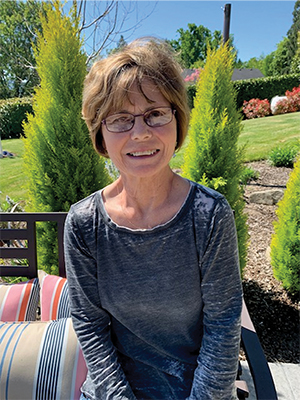Lung Cancer Survivor
Focus on the Good Things in Life
 Since 2014, retired educator Ginny Hicks has managed Stage IV non-small cell lung cancer with an assortment of treatments. Today, she shares her wisdom and positive attitude with other Stage IV lung cancer survivors and is an advocate for preventive screenings. She and her husband enjoy life in southern Oregon, and having their daughter and grandson nearby makes it easier to make the most of every day.
Since 2014, retired educator Ginny Hicks has managed Stage IV non-small cell lung cancer with an assortment of treatments. Today, she shares her wisdom and positive attitude with other Stage IV lung cancer survivors and is an advocate for preventive screenings. She and her husband enjoy life in southern Oregon, and having their daughter and grandson nearby makes it easier to make the most of every day.
A swollen area under my left arm prompted me to call my doctor. I’d recently had a mammogram with good results, but I went in for another one. After determining the lump wasn’t breast cancer, my doctor ran a series of tests. Results from a chest CT showed a tumor in the middle lobe of my right lung, and a PET confirmed it had spread to lymph nodes under my arm and in my chest. I was diagnosed with Stage IV non-small cell lung cancer (NSCLC) at 58 years old.
I was shocked because cancer doesn’t run in my family. I used to say we were “stroke and heart attack” people, and I lived a healthy lifestyle to help prevent having a stroke or heart attack. I was a runner in my younger days, then became an avid walker. And I was never a smoker.
My sister-in-law worked with the thoracic surgeon who performed a bronchoscopy in an attempt to reach some lung tissue. He couldn’t reach lung tissue, but he also saw what he thought were cancerous spots. He recommended an oncologist who is affiliated with a nearby teaching hospital. She is the best. She works hard to do what is right for me.
I began my treatment the day before my 59th birthday. It consisted of two types of chemotherapy for 18 months. After that, my doctor suggested a type of immunotherapy called an immune checkpoint inhibitor. I was somewhat familiar with immunotherapy, and my doctor explained more about it. She knew it was important to me to stay active with yardwork, walking and taking trips, and she felt I’d be able to continue those activities on this therapy. I did well on it.
Soon after, I was tested for PD-L1. Because the tumor expressed it, I was switched to another checkpoint inhibitor. My experience with both immunotherapy drugs was a piece of cake. I was in and out of the treatment facility in about 30 minutes, and I had no side effects with either drug.
I was then tested for the BRAF gene, which I had, so my doctor started me on a targeted therapy in pill form. Through day seven, I felt great. On day eight, I developed multiple side effects: rash, fever, shaking, nausea, vomiting and more. It was the weekend, so I went to the emergency room. The ER doctor advised I stop taking the pills. He set up an appointment with my oncologist first thing Monday morning and sent me home. My doctor diagnosed it as a rare and serious skin reaction. It isn’t a common reaction to the targeted therapy I was taking but, because it happened to me, I went back on the chemotherapy regimen that we knew I could tolerate.
In December 2018, a tumor on my lung was blocking my airway, causing a nagging cough. I had six rounds of radiation therapy, followed by chemotherapy.
In January 2019, the lymph nodes in my abdomen were pressing on some of my organs and my bowels became distended. I went back on chemotherapy. My doctor prescribed narcotics because it was very painful, and I became severely constipated. My nurses suggested several solutions, and I tried them all — water, stool softeners, prune juice and more. I hit the constipation from all sides, and it really resolved once I was finished with the pain pills.
My husband is my primary caregiver, and he is wonderful. My daughter and her son moved to be closer to us after I was diagnosed. She formerly worked with children in the oncology field, and she is very knowledgeable, which is helpful.
I realize how valuable support is, so, once I felt well enough, I started a cancer support group with a friend who also has Stage IV NSCLC. And, I’m a phone buddy for other survivors through the GO2 Foundation. To actively promote screenings and awareness, I submit articles to our local newspaper every November during Lung Cancer Awareness Month. I travel to Washington, D.C., every July with other survivors and advocates to encourage members of Congress to increase funding for research and low-level CTs for screening.
None of us are guaranteed a tomorrow, whether we have cancer or not. I have CTs regularly, and my doctor is considering maintenance therapies. Unfortunately, the risk of another allergic reaction really limits my treatment options.
I focus on the good things in my life. My daughter is healthy, and my grandson is healthy. I hold on to that and make the most of every day.


